 MyDogBreeds
MyDogBreeds Pomsky is originated from United States but Canadian Eskimo Dog is originated from Canada. Pomsky may grow 33 cm / 12 inches shorter than Canadian Eskimo Dog. Pomsky may weigh 26 kg / 57 pounds lesser than Canadian Eskimo Dog. Both Pomsky and Canadian Eskimo Dog has same life span. Both Pomsky and Canadian Eskimo Dog has almost same litter size. Both Pomsky and Canadian Eskimo Dog requires Moderate maintenance.
Pomsky is originated from United States but Canadian Eskimo Dog is originated from Canada. Pomsky may grow 33 cm / 12 inches shorter than Canadian Eskimo Dog. Pomsky may weigh 26 kg / 57 pounds lesser than Canadian Eskimo Dog. Both Pomsky and Canadian Eskimo Dog has same life span. Both Pomsky and Canadian Eskimo Dog has almost same litter size. Both Pomsky and Canadian Eskimo Dog requires Moderate maintenance.
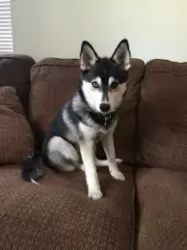 Pomskies are such cute little wolf-like dogs, you just wish they’d been around much sooner.
Pomskies are such cute little wolf-like dogs, you just wish they’d been around much sooner.
They’re a fairly new addition to the breed of designer dogs, believed to have originated in 2009, in the United States. Today they are a well known, and sought after designer dog breed.
They are a cross between the Pomeranian and a Siberian Husky. As a designer dog breeds, the Pomeranian Husky isn’t recognized by the American Kennel Club. There is a Pomsky Club of America and they are wanting to get the breed registered.
 The Canadian Eskimo Dog dates way back to more than 4,000 years ago. This Arctic breed of dog was developed to pull sleds, and wasn’t considered as a pet but as a working dog – an important means to an end – a tool for use.
The Canadian Eskimo Dog dates way back to more than 4,000 years ago. This Arctic breed of dog was developed to pull sleds, and wasn’t considered as a pet but as a working dog – an important means to an end – a tool for use.
By the 1960s the dog breed had declined to such an extent that they were removed from UKC and AKC registries. It is believed that the breed would have in all likelihood become extinct if it weren’t for the efforts of Brian Ladoon, William Carpenter and John McGrath who formed the Eskimo Dog Research Foundation in 1972.
After breeding for 30 years, the dog has the biggest genetic stock colony of Canadian Eskimo Dogs and in May 2000, Nunavut, a Canadian territory, adopted the dog as the animal symbol for this region.
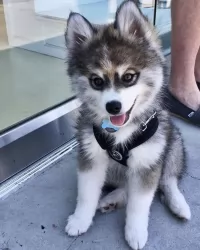 Just like most hybrid breeds, the Pomsky can have mixed looks – taking more after one or the other dog.
Just like most hybrid breeds, the Pomsky can have mixed looks – taking more after one or the other dog.
They can stand between 25 to 40cm in height and weigh between 9 to 14kg. The dog looks like a small Husky, but even so, in one litter, there can be some variety between the puppies in terms of looks and temperament.
The dogs have a soft double coat that keeps the dog comfortable in icy temperatures. Coat colors vary and the coats can be grey and white, a reddish brown or even solid white.
You’ll find your Pomsky to be amusing and entertaining as he is quite clownish.He fits quite easily into life in the city or in the countryside.
Wherever you are, part of being a responsible dog owner includes taking him for walks and seeing that he gets enough exercise. He is a vocal dog, which might not be good in the city if you live near to your neighbors as he can howl and whine quite a bit.
Training and socialization will be important for him, particularly as he tends to be nervous around strangers. Socialization makes him obedient, well balanced an well behaved.
They are playful, loving dogs and intelligent too so you won’t have trouble getting him trained and socialized.
 The Canadian Eskimo Dog is a well-built, medium- to large sized dog looking much like a husky. The male Eskimo dog is somewhat bigger than the female, standing 58 – 70cm at the shoulder and weighing 30 - 40kg.
The Canadian Eskimo Dog is a well-built, medium- to large sized dog looking much like a husky. The male Eskimo dog is somewhat bigger than the female, standing 58 – 70cm at the shoulder and weighing 30 - 40kg.
The male often has some thick fur around the neck, giving him the appearance of looking larger than he actually is. He is slightly larger than the female. Other people say he has a similar appearance to a wolf.
He has a thick double coat which can be white, gray, fawn or even black and white. He has short, erect ears, dark brown eyes and a bushy, feathered tail which curls over the back. Sometimes you find blue eyes with the Canadian Eskimo Dog, and its only when you want to show him, that this isn’t acceptable.
The Canadian Eskimo Dog's temperament is hard working, tough, brave, alert and intelligent. When he is trained and socialized, which will be important for this breed, he becomes gentle and loving, forming a strong bond with his owner. He’ll also get along well with children in the home as well as other pets.
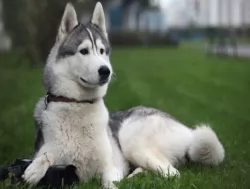 A Pomsky is such a great pet to have. They’re intelligent dogs and respond well to training and socialization.
A Pomsky is such a great pet to have. They’re intelligent dogs and respond well to training and socialization.
They’re playful, confident and full of life and want nothing more than to be an active member of the family. He will need quite a bit of exercise and will love playing with the children in the home.
Provide him with love and care, and you can count him in as a faithful, loving pet and companion.
 The Canadian Eskimo Dog is a dog which is responsive to training. With training and socialization, as a highly intelligent, strong-will dog he will need to be supervised by a firm, authoritative figure.
The Canadian Eskimo Dog is a dog which is responsive to training. With training and socialization, as a highly intelligent, strong-will dog he will need to be supervised by a firm, authoritative figure.
He makes such an awesome pet when properly trained, and if you’re a responsible dog owner who knows how to care for- and exercise your pet appropriately, you’ll be rewarded by having a strong, loving companion at your side.
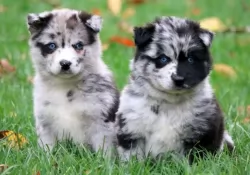 Your Husky and Pomeranian mix promises to be resilient in the face of illness if you feed him well and exercise him. Still, no dog is immune from the many common health issues there are that plague dogs.
Your Husky and Pomeranian mix promises to be resilient in the face of illness if you feed him well and exercise him. Still, no dog is immune from the many common health issues there are that plague dogs.
As a responsible dog owner, as soon as your pet is showing signs of being sick and in distress, you need to get him to the vet. Some common dog illnesses include bloat, cancer, skin allergies and hip dysplasia.
Bloat, also known as Gastric Dilatation and Volvulus:
This can be deadly for dogs, and when you see your dog’s stomach swollen and hard and he is restless and drooling, vet attention is required immediately.
The stomach is twisted and filled with gas that can’t escape. Pressure within the stomach puts pressure on other body organs and this can result in blood flow to the heart being stopped.
There are a number of theories as to why bloat occurs, but it is better to give your pet a couple of smaller meals a day instead of one large one which he gobbles up too quickly.
Its tempting to give your dog a piece of chocolate when he looks so pleadingly at you, but chocolate as well as other human foods can be toxic for your dog.
Chocolate has ingredients which are safe for human consumption but which can lead to a host of medical complications for your dog. Your dog may vomit, have rapid breathing, an increased heart rate and even seizures – it’s just not worth taking the chance.
 The Canadian Eskimo Dog is a generally healthy breed who has a life expectancy of between 10 and 15 years when he is lovingly cared for and provided with a top quality diet. Ensure that he has a top quality diet with plenty of raw meat geared towards his age and energy levels.
The Canadian Eskimo Dog is a generally healthy breed who has a life expectancy of between 10 and 15 years when he is lovingly cared for and provided with a top quality diet. Ensure that he has a top quality diet with plenty of raw meat geared towards his age and energy levels.
The Canadian Eskimo Dog suffers from common health issues that most dogs are at risk for, and typically this will include hip dysplasia and eye disease. If your dog develops a disease such as hip dysplasia, speak to your vet immediately.
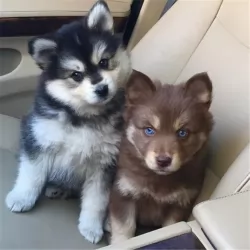 The thick coat sheds quite a bit so it will need to be brushed at least twice a week to keep it vibrant and shiny.
The thick coat sheds quite a bit so it will need to be brushed at least twice a week to keep it vibrant and shiny.
Nails will need to be trimmed regularly if they don’t wear down themselves. You will also need to check your dogs teeth when you brush him. A bad tooth can cause ill health that can damage the heart and kidney.
Your Pomsky is an energetic dog that requires a lot of exercise. While he will love a walk every day, they want more than that – loving to play ball- and frisbee games with all that energy.
Pomsky owners can’t be couch potatoes as this energetic dog will become bored, frustrated and destructive, and then an irresponsible owner blames the dog.
With so much energy, your Pomsky is going to require high quality food that ensures his energy levels remain high. Commercially manufactured dog foods can be wonderfully convenient, and the best ones can be excellent for your pet, with the right balance of vitamins and minerals.
High quality dry kibble can get a bit boring so add in some home-made food to the dry kibble to make it more interesting. Dogs thrive on simplicity, so boiled chicken, sweet potatoes, brown rice or pasta, carrots and spinach will be 100% sufficient for him. This can be chopped up into his dry kibble occasionally as a welcome treat.
Also, your pet will thrive on a bit of raw meat added in from time to time. Make sure he is never without a constant supply of fresh, cool water.
 The Canadian Eskimo Dog has always been a working dog, used to being driven hard to perform, and to this day he likes to work hard and have his day filled with activities.
The Canadian Eskimo Dog has always been a working dog, used to being driven hard to perform, and to this day he likes to work hard and have his day filled with activities.
His exercise requirements are high and this is one breed that you’re going to have to exercise regularly – long walks, running on a leash as you cycle, ball games, swimming, hiking. It is why the dog is best suited for life in the country as opposed to small properties in the city. If exercise seems like a lot of hard work for you, don’t buy such a breed as it will be cruel and irresponsible to leave him day after day in your back yard. He becomes bored, frustrated, unhappy and destructive.
The dog is an average shedder and his coat is short and dense. There’s not a whole lot of maintenance to worry about with this good-looking dog and he will basically require having a good brush twice a week.